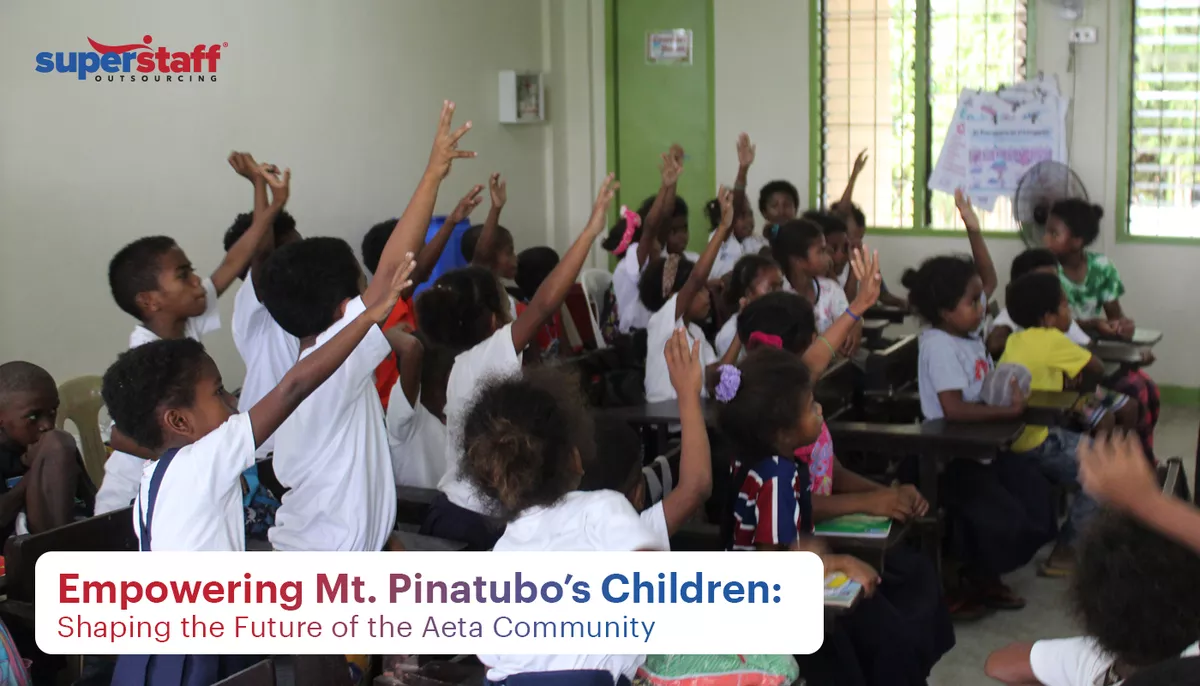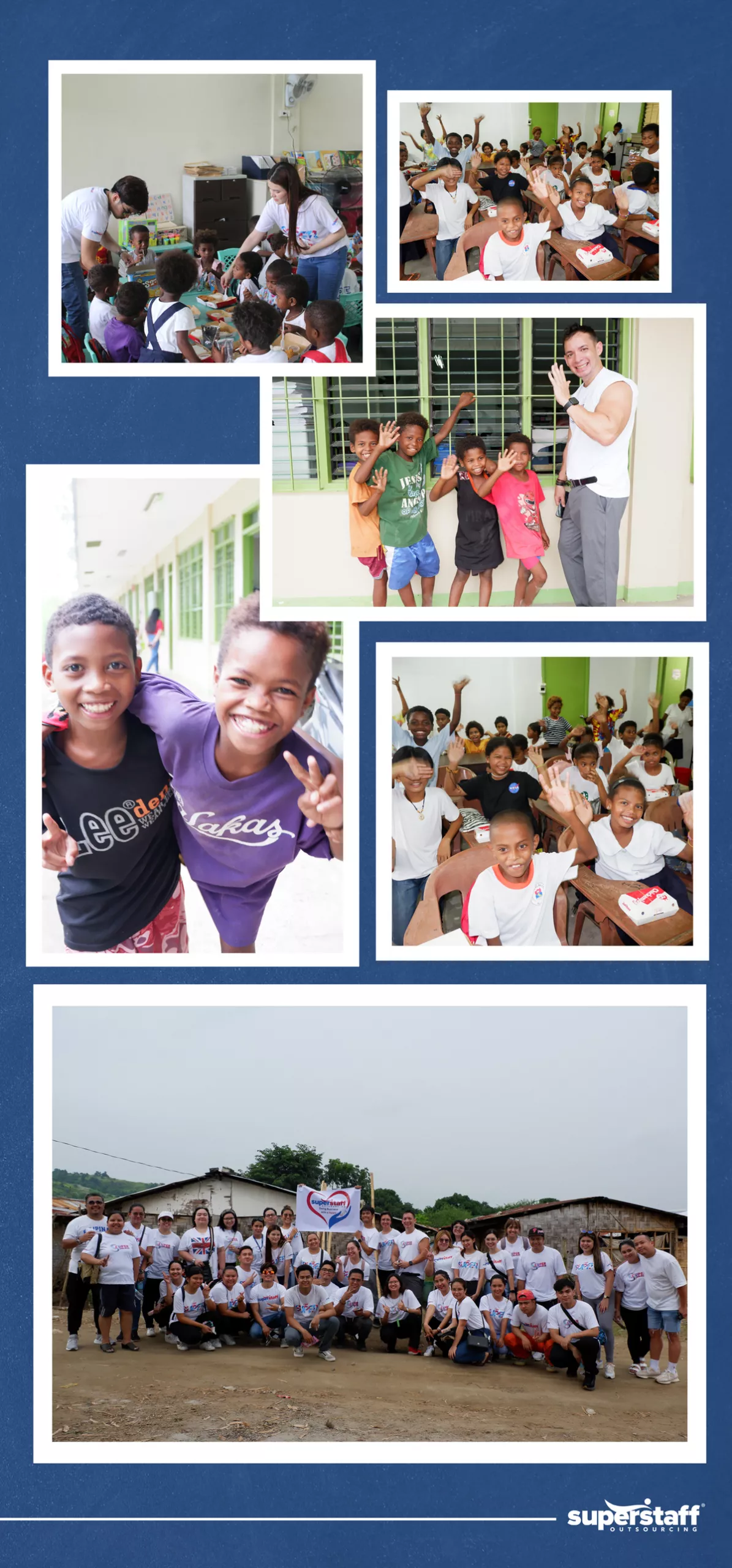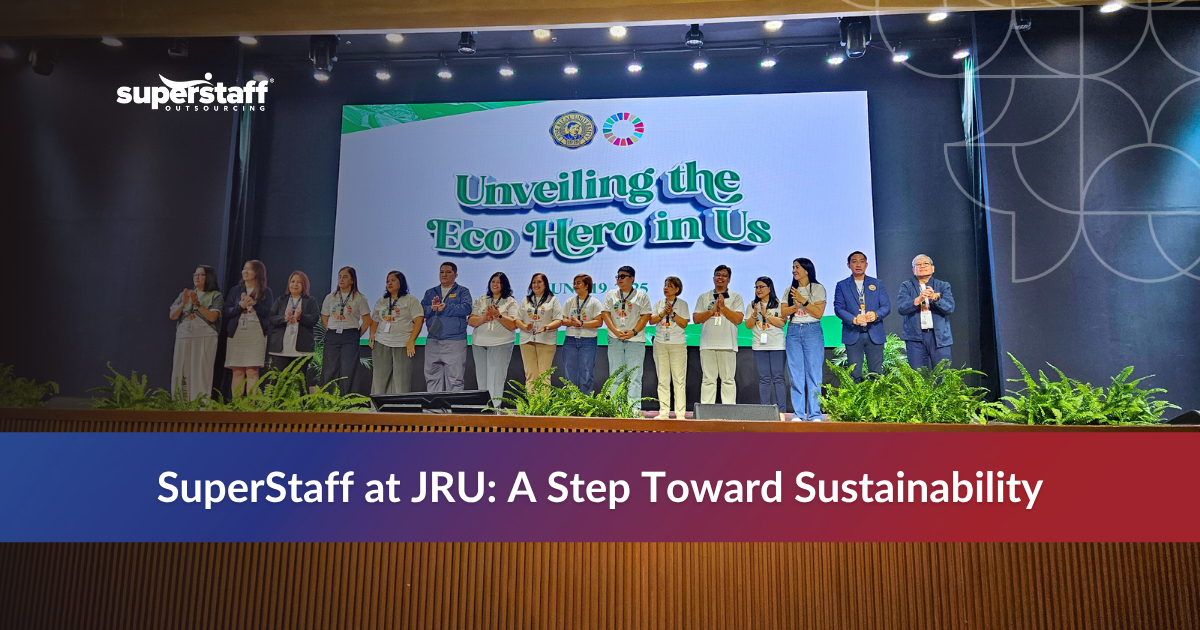
SuperStaff’s “Doing Business With a Heart ” initiative held last September 22, 2023 is a testament to the company’s commitment to creating positive social impact. This Corporate Social Responsibility (CSR) endeavor focused on supporting the Aeta students of Camias Resettlement Elementary School (ES) in Porac, Pampanga.
Apart from donation, our team also dedicated a day to immerse themselves in the community — seeking to gain a deeper understanding of the challenges faced by the Aeta children and their families.
Who Are the Aetas: Guardians of Luzon’s Mountains
A distinct ethnolinguistic group within the Philippines, the Aetas possess a unique cultural heritage that has been intricately woven into the fabric of Luzon’s mountainous landscapes for centuries. They reside in various Luzon provinces, including Pampanga, Zambales, and Tarlac, but are particularly prominent in the towns of Floridablanca, Porac, Guagua, and Angeles in Pampanga.
What sets the community apart is their steadfast commitment to preserving ancient traditions and cultural practices which have been passed down through generations. In doing so, they play an integral role in shaping the tapestry of the Philippines’ ethnic diversity.
The Aetas’ cultural heritage is a living testament to their ability to adapt and thrive in the diverse landscapes of Luzon. Their practices, which are rooted in an intimate understanding of nature, serve as a beacon of wisdom for future generations. By safeguarding these traditions, the Aetas have enriched the broader cultural mosaic of the Philippines and left an indelible mark on the nation’s collective identity.
A Cataclysmic Turning Point
Mount Pinatubo’s eruption in 1991 was a pivotal moment in the history of the Aeta people. Before this tragic event, the Aetas’ way of life was intricately interwoven with the presence of the mountain. Their survival and cultural practices were intimately connected to the resources from Pinatubo. Beyond just a physical landscape, it served as a spiritual and cultural cornerstone for the Aetas.
However, its eruption and the subsequent lahars, or volcanic mudflows, brought unprecedented devastation to their ancestral lands. Families were uprooted, homes were destroyed, and the familiar terrain they had known for centuries was forever changed. This disrupted the delicate balance that once sustained their way of life.
The displacement of families, the loss of their homes, and the rapid transformation of their environment forced the Aetas to confront a challenging reality — one that required them to find new ways to secure their livelihoods and preserve their cultural heritage.
Adapting to a New Reality
To escape the dangers of Pinatubo, the Aetas were relocated to areas such as Camias Resettlement.
They transitioned from a hunting and gathering society to becoming wage workers, toiling for money in order to survive. They ventured into agriculture, sold their indigenous crafts, and engaged in wage labor. Their resilience and resourcefulness shone through as they sought out alternative means to secure their livelihoods.
Camias Resettlement ES’ Crucial Role in Youth Empowerment
Camias Resettlement Elementary School (ES), situated in Barangay Camias, Porac, Pampanga, holds a profound significance in the ongoing narrative of empowerment and resilience within the Aeta community. Central to the school’s mission is the provision of access to formal education for the Aeta children. This serves as a means to break free from the constraints that displacement and adversity have imposed. By imparting essential skills, knowledge, and a foundation for lifelong learning, Camias Resettlement ES equips Aeta youth with the tools they need to navigate a rapidly changing world.
This institution goes beyond the realms of conventional education. It stands as a living museum, a custodian of the Aeta’s rich and diverse cultural heritage. Within its walls, traditions are not just preserved; they are celebrated, taught, and passed down from one generation to the next. Language, practices, and the wisdom of centuries find a sanctuary within the school’s embrace. The school ensures that the legacy of the Aeta people endures, not as a relic of the past, but as a vibrant and living testament to their enduring spirit.
In essence, Camias Resettlement ES acts as a bridge between the challenges of the present and the aspirations of the future for the Aeta community. Through the school faculty and administration’s unwavering commitment, it shapes not only the academic development of its students but also cultivates a profound sense of pride and belonging within the Aeta youth.
Breaking the Cycle of Poverty
Education has proven to be a powerful tool in breaking the cycle of poverty. By providing access to formal education, Camias Resettlement ES opens doors to higher learning, improved livelihoods, and more opportunities for the Aeta youth. Through education, they gain the skills and knowledge needed to pursue a brighter future, transcending the limitations that the eruption of Mount Pinatubo imposed on their community.
Fostering Integration and Environmental Awareness
While preserving their cultural identity remains paramount, education also facilitates the integration of Aeta youth into the broader society of the Filipino. Through academic integration, Aeta youth gain access to resources, services, and opportunities beyond their immediate community, enabling them to thrive in a rapidly changing world.
Moreover, Camias Resettlement ES also instills a sense of environmental awareness and conservation among its students. Given the Aeta community’s historical reliance on natural resources, this knowledge is crucial for striking a balance between their traditional way of life and modern environmental concerns.
Forging the Path Toward a Brighter, More Inclusive Future
SuperStaff’s “Doing Business With a Heart” initiative exemplifies a commitment to making a meaningful difference in the lives of others.
You can also donate to the Aeta students through Camias Resettlement ES. They are in need of school supplies such as pencils and notebooks for the children. You may also donate grocery packs to their families.
By supporting the school, we play a part in the larger narrative of empowerment and resilience of the community. As we move forward, this initiative shows that together, we can create a brighter, more inclusive future for all.







